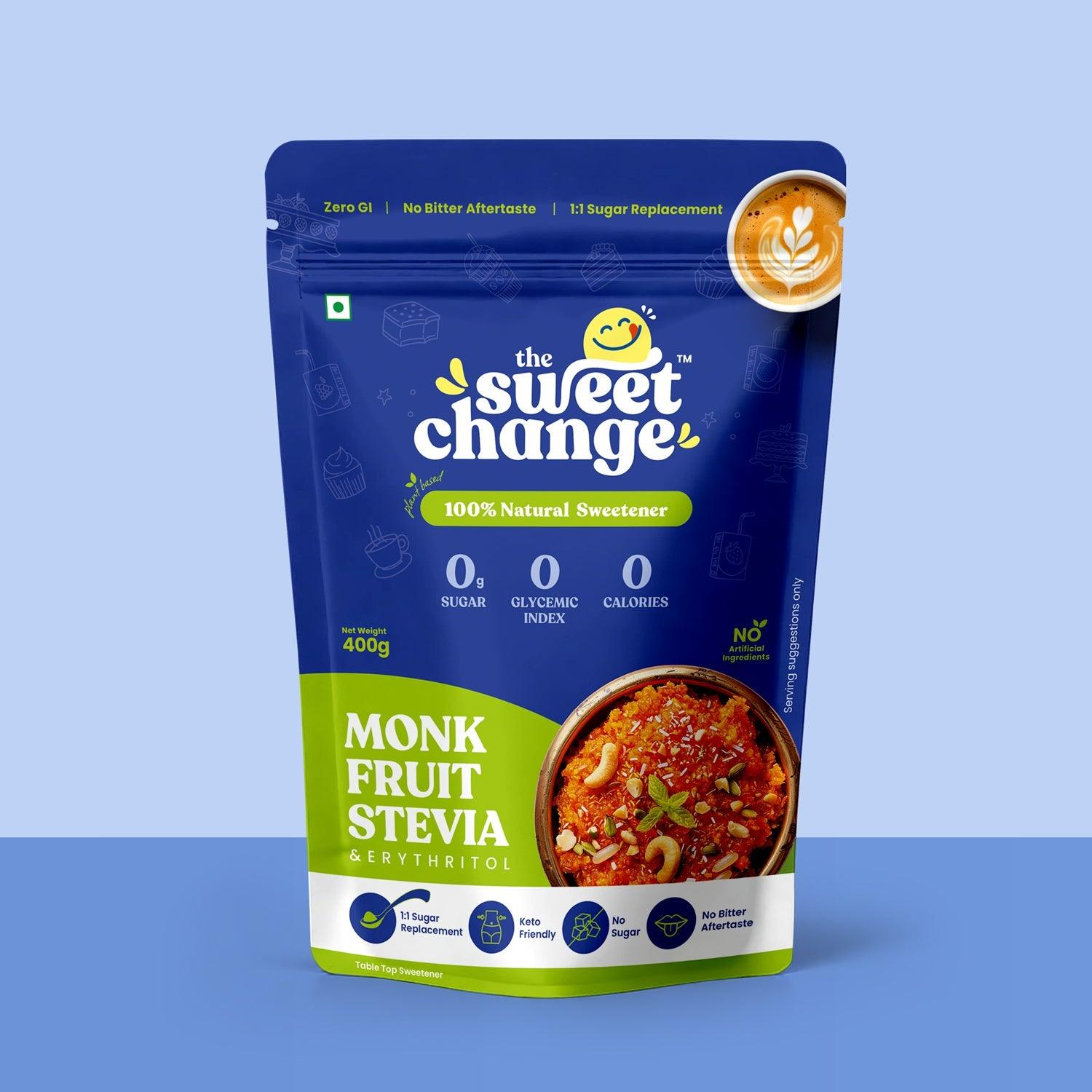
Is Milk Good for Diabetes? The Truth About Dairy and Blood Sugar
Share
Milk has long been marketed as a complete health drink rich in protein, fats, and carbohydrates. But when it comes to type 2 diabetes, insulin resistance, and metabolic health, the story is more complex. While dairy provides calcium and protein, multiple studies show that milk may not be the best option for people with diabetes.
In this article, we’ll break down the relationship between milk and diabetes, explore risks vs. benefits, share calcium-rich alternatives, and compare almond milk vs. cow milk for better blood sugar management.
Milk and Diabetes: Why It May Be Risky
1. Carbohydrate Content (Lactose & Blood Sugar Spikes)
- A standard glass of cow milk (8 oz / 240 ml) contains 12–13 g of carbohydrates, mostly in the form of lactose.
- These carbs can raise blood glucose levels after meals, which is a challenge for people with type 2 diabetes.
- To make matters worse, nearly 70% of Indians are lactose intolerant, which impairs digestion and calcium absorption.
2. Fat Content & Insulin Resistance
- Whole milk contains 3.5–5% fat, much of which is saturated.
- Excess fat in the diet can accumulate around the pancreas and muscle cells, interfering with insulin function. This contributes to insulin resistance, a key factor in type 2 diabetes progression.
3. Insulin-like Growth Factor (IGF)
- Cow milk contains IGF (Insulin-like Growth Factor), a hormone that mimics insulin but doesn’t perform its role effectively.
- IGF may block real insulin from opening cells for glucose uptake, worsening insulin resistance.
- Cutting out dairy has been shown in clinical practice to lower blood sugar and improve insulin sensitivity.
Milk and Bone Health: Busting the Calcium Myth
For decades, we’ve been told that milk is the ultimate source of calcium for strong bones. But evidence paints a different picture, especially in India.
Despite an average per capita consumption of 427 g of milk daily, India still contributes to nearly 25% of global osteoporosis cases.
Why Milk May Not Prevent Bone Weakness
-
High Acid Load : Animal proteins in milk create an acidic environment, forcing the body to leach calcium from bones to neutralize it.
-
Lactose Intolerance : Nearly 70% of Indians are lactose intolerant, which reduces digestion and calcium absorption efficiency.
-
Vitamin D Deficiency : Around 70–90% of Indians lack vitamin D, a key nutrient needed for calcium absorption and bone mineralization.
Nutritional Comparison

The Reality: Plant-Based Calcium is More Bioavailable
Instead of relying solely on milk, plant-based foods offer calcium that is easier for the body to absorb and come without the side effects of lactose or excess fat. Excellent options include:
- Sesame seeds (Til)
- Moringa & leafy greens
- Tofu & soy products
- Ragi (finger millet)
- Almonds
Takeaway
For bone health in diabetics and the general population, plant-based calcium sources outperform milk. They support better absorption, stronger bones, and improved metabolic health without raising blood sugar or worsening insulin resistance.
Almond Milk vs. Cow Milk: Which is Better for Diabetes?
When it comes to managing diabetes and blood sugar control, not all types of milk are created equal. Here’s how unsweetened almond milk compares with cow’s milk:
Blood Sugar Impact
-
Cow Milk : Contains 12 g of lactose (milk sugar) per cup, which can cause post-meal blood sugar spikes. The higher fat content (especially saturated fat) may also worsen insulin resistance.
-
Almond Milk (unsweetened) : Extremely low in carbs and sugar, making it virtually blood sugar neutral. Also lighter in calories, supporting weight management, which is crucial for type 2 diabetes.
For people with diabetes, prediabetes, or insulin resistance, unsweetened almond milk is a safer, smarter choice. It helps :
- Minimize blood sugar fluctuations
- Support weight control
- Avoid lactose intolerance issues (affecting ~70% of Indians)
If you prefer cow milk, choose low-fat or toned milk in small portions, but for the best results in diabetes management, almond milk outperforms cow milk.
Best Non-Dairy Calcium Sources in India for Diabetics
Dairy isn’t the only way to get strong bones. These calcium-rich, diabetes-friendly Indian foods are often more bioavailable and easier to digest than milk :
- Sesame seeds (Til): 975 mg calcium per 100 g - one of the richest natural sources.
- Chia / Sabja seeds: 630 mg per 100 g - also packed with fiber for better blood sugar control.
- Tofu (soy paneer): 350–680 mg per 100 g - a versatile, plant-based protein plus calcium boost.
- Ragi (finger millet): 344 mg per 100 g - a staple Indian supergrain for bone and glucose health.
- Moringa, amaranth, fenugreek leaves: 200+ mg per serving - green leafy powerhouses for calcium and iron.
- Almonds: 250 mg per 100 g - nutrient-dense and diabetic-friendly when eaten in moderation.
Practical Tips for Diabetics When Choosing Milk
- Limit dairy portions – If you drink cow’s milk, choose low-fat or toned milk and keep it to a small glass (½–1 cup/day).
- Go plant-based – Unsweetened almond, soy, or oat milk is low-carb, lactose-free, and safer for blood sugar control.
- Pair with fiber – Combine milk with oats, chia, or flaxseeds to slow glucose absorption.
- Avoid hidden sugars – Skip flavored or sweetened varieties that contain added sugar or maltodextrin.
- Track your response – Use a glucometer or CGM to see how your body reacts after consuming milk.
Conclusion: Should Diabetics Drink Milk?
While cow milk provides protein and calcium, it is not the most diabetes-friendly option. Its lactose (natural sugar) content can raise post-meal blood glucose levels, while saturated fats and Insulin-like Growth Factor (IGF) compounds may worsen insulin resistance - a major factor in type 2 diabetes progression.
For individuals managing diabetes, prediabetes, or insulin resistance, plant-based alternatives offer a safer and more effective option. Unsweetened almond milk, soy milk, or oat milk deliver similar creaminess with fewer carbs, lower calories, and no lactose, making them better for blood sugar control.
At the same time, calcium and bone health don’t depend on milk. Calcium-rich Indian superfoods such as sesame seeds, ragi, tofu, chia seeds, almonds, moringa, and spinach provide highly bioavailable calcium along with additional fiber, antioxidants, and nutrients that support overall metabolic health.
For most people with diabetes, reducing or avoiding dairy and choosing plant-based milks and whole-food calcium sources supports better blood sugar control, stronger bones, improved digestion, and sustainable weight management.
By making this swap, diabetics can protect long-term metabolic health while still enjoying delicious, nutrient-dense meals without compromising taste.
Is milk good or bad for diabetes?
Milk contains lactose (a natural sugar), which can raise blood glucose levels after drinking. For people with type 2 diabetes or insulin resistance, frequent consumption of cow milk may not be ideal. Research also suggests that dairy fat and insulin-like growth factors (IGF) in milk may worsen insulin sensitivity. Unsweetened plant-based alternatives like almond milk, soy milk, or oat milk are generally better choices as they are low in carbs, lactose-free, and have minimal effect on blood sugar.
Which type of milk is best for diabetics?
The best milk for diabetes management is unsweetened plant-based milk such as almond milk, soy milk, or oat milk. These options are low in carbohydrates (1–2 g per cup), contain healthy fats, and have a low glycemic index, meaning they don’t cause sharp blood sugar spikes. If you prefer dairy, toned or skimmed cow milk in small quantities is better than full-fat versions, but plant-based milk remains the safer choice.
Can diabetics drink cow milk daily?
Yes, diabetics can drink cow milk in moderation, but portion control is key. Stick to one small glass (120–150 ml) of low-fat or skim milk and always monitor post-meal blood sugar levels. However, replacing cow milk with unsweetened almond milk or soy milk may provide better blood sugar control, weight management benefits, and improved digestion, especially for those with lactose intolerance (which affects nearly 70% of Indians).
Does milk cause insulin resistance?
Studies indicate that saturated fats in dairy and compounds like Insulin-like Growth Factor (IGF) can contribute to insulin resistance. Insulin resistance is when your body’s cells stop responding properly to insulin, leading to higher blood glucose levels and eventually type 2 diabetes. While occasional small servings of low-fat milk may not harm everyone, long-term, high dairy intake could worsen insulin sensitivity in people at risk of diabetes.
What are the best calcium sources for diabetics without milk?
Diabetics don’t need milk to meet calcium needs. Many plant-based calcium sources are healthier, easier to digest, and more bioavailable than dairy. Great options include:
Sesame seeds (Til): 975 mg calcium per 100 g
Chia / Sabja seeds: 630 mg per 100 g
Tofu (soy paneer): 350–680 mg per 100 g
Ragi (finger millet): 344 mg per 100 g
Almonds: 250 mg per 100 g
Leafy greens: moringa, spinach, amaranth, fenugreek (200+ mg per serving)
These foods, combined with adequate Vitamin D (sunlight exposure), support stronger bones and better overall health without the blood sugar risks of milk.
References
https://pubmed.ncbi.nlm.nih.gov/7234720/
https://nutritionandmetabolism.biomedcentral.com/articles/10.1186/1743-7075-8-41
https://pubmed.ncbi.nlm.nih.gov/25091791/
https://pubmed.ncbi.nlm.nih.gov/12953084/
https://pmc.ncbi.nlm.nih.gov/articles/PMC4337919/
https://pubmed.ncbi.nlm.nih.gov/19889824/
https://pmc.ncbi.nlm.nih.gov/articles/PMC3978780/
https://www.mdpi.com/2071-1050/13/16/8677
https://pubmed.ncbi.nlm.nih.gov/33889131/
https://www.nature.com/articles/s41387-024-00257-7

Silver Medalist with an M.Sc in Food & Nutrition, I lead strategic initiatives at Breathe Well-being to reverse Type 2 Diabetes—driving brand strategy, market insights, and sales team enablement. I create patient- and HCP-focused content and mentor nutrition consultants to deliver high-impact webinars and consultations. Currently pursuing a Master’s in Digital Marketing & Analytics from ISB, I merge clinical expertise with data-driven marketing to transform chronic care and improve health outcomes.



 https://www.thesweetchange.com
https://www.thesweetchange.com